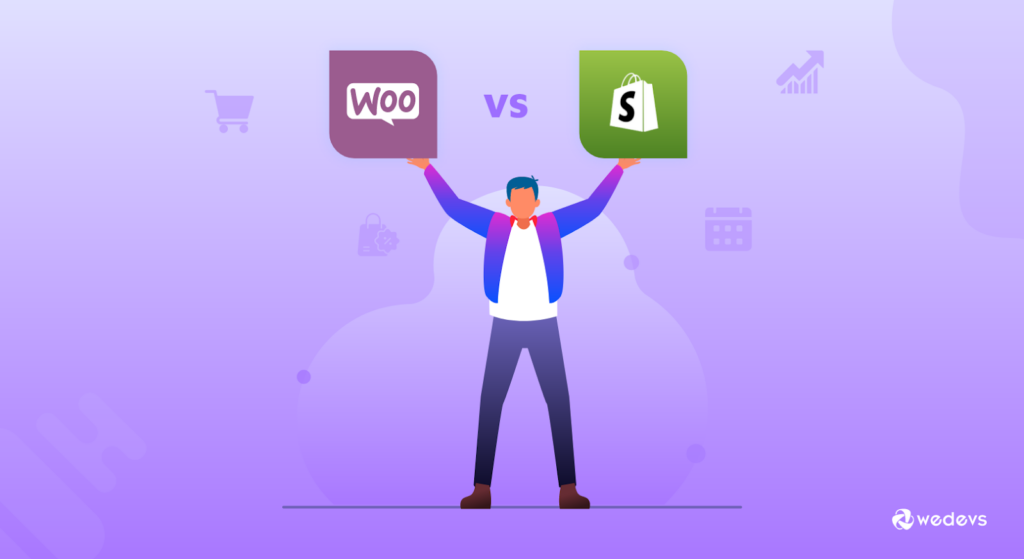Shopify vs. WordPress (WooCommerce) – Which eCommerce Web Builder Is Best? This age-old debate has left many online entrepreneurs and business owners pondering the right choice for their online stores. In this comprehensive blog post, we will dissect both platforms, delving into their unique features, strengths, and weaknesses.
WooCommerce Overview
WooCommerce is an open-source eCommerce platform powered by Bluehost that integrates seamlessly with WordPress websites. It allows users to convert their existing site into an online store using the WooCommerce extension, offering limitless customization options and a range of premium themes. Although initially free to use, there are additional costs associated with running a WooCommerce store such as hosting fees and paid extensions.
Seamless integration with WordPress websites
The primary advantage of WooCommerce lies in its seamless integration with the popular WordPress content management system (CMS). This makes it easy for website owners who already have a WordPress-based site to add eCommerce functionality without having to switch platforms or learn new tools. The process involves simply installing the official WooCommerce plugin on your existing website and following some basic setup steps.
Limitless customization options
WooCommerce’s open-source platform provides an abundance of customization options, allowing users to personalize their store with a range of themes and plugins. You can choose from thousands of free and premium themes available at the theme store, as well as numerous plugins designed specifically for this purpose. Additionally, if you possess coding skills or hire a developer, you can further tailor your eCommerce solution according to your unique requirements.

Additional costs for hosting and extensions
While WooCommerce itself is free to use, there are some additional expenses you should be aware of when running a WooCommerce store. Selecting a dependable web hosting provider is an important step in running your WooCommerce store, as it can influence the website’s security and speed. Hosting fees can vary greatly depending on the provider and plan chosen.
Besides web hosting costs, you may also need to invest in premium themes or paid extensions if you require advanced features not available through free options. For example, certain shipping integrations or search engine optimization (SEO) tools might come at an extra cost. ‘
However, given the vast number of free resources available within the WordPress ecosystem – such as plugins developed by third-party developers – many store owners find that they can build their ideal eCommerce solution without breaking the bank.
Final Verdict
Overall, WooCommerce is a great option for businesses that are already familiar with WordPress and have the resources to invest in hosting and additional extensions. However, Shopify offers more advanced features compared to WooCommerce such as built-in multi-channel integration capabilities and transparent pricing plans including a 3-day free trial which make it an attractive alternative for those who want greater control over their e-commerce website.
Shopify Overview
Shopify is a complete eCommerce solution created by Tobias Lutke and Scott Lake that provides more advanced features than WooCommerce out-of-the-box. With its built-in multi-channel integration capabilities along with sleek themes at transparent pricing plans (including a 3-day free trial), it appeals more to beginners who want a straightforward setup process without much hassle or a learning curve involved.
Advanced Features Compared to WooCommerce
Unlike Shopify, the WooCommerce store offers basic functionalities as an open-source platform. However, Shopify delivers a comprehensive range of tools for online selling right from the start. Some of these advanced features include abandoned cart recovery, email marketing automation, and support for digital goods sales. Additionally, the Shopify platform boasts various apps in its app store, which can further enhance your e-commerce business operations.
Built-In Multi-Channel Integration Capabilities

Transparent Pricing Plans Including 3-Day Free Trial
Shopify pricing is transparent and offers a 3-day free trial, allowing you to test out the platform before committing to any of their plans. There are three main Shopify plans: Basic Shopify, Shopify, and Advanced Shopify. Each plan comes with its own set of features tailored for businesses at different stages:
In addition to these standard plans, there’s also a “Lite” option available which allows users who already have an existing website (not built on WordPress) the ability to sell products through social media channels & other external platforms without having access to full suite offerings provided by higher-tiered subscriptions mentioned above – making it perfect choice those wanting dip toes into world eCommerce without breaking bank.
Final Verdict
Shopify offers a great selection of features, including multi-channel integration and transparent pricing plans. With its superior customer support and clearer dashboard layout, Shopify is the better choice for those who want an easy-to-use eCommerce platform.
User-friendliness Comparison
Both eCommerce platforms offer an array of integrations and features, in addition to standard product tracking abilities. However, they differ significantly in terms of usability aspects such as dashboard layout and support channels provided. In this section, we will compare the user-friendliness of both platforms to help you make an informed decision for your online store.
Superior Customer Support Offered by Shopify
Shopify’s customer support is available 24/7 via live chat, phone calls, and emails. This superior customer support from Shopify ensures that any issues or questions can be addressed quickly and effectively. On the other hand, WooCommerce lacks an official support channel presence, which means users must rely on community forums or third-party developers for assistance.
Clearer Dashboard Layout on Shopify’s Admin Panel
The dashboard layout in Shopify’s admin panel features clear navigation menus that allow users to easily manage their online stores without feeling overwhelmed by options. Conversely, WooCommerce has numerous settings and options within its admin area that can feel cluttered at times – making it less beginner-friendly compared to its competitor here discussed today.

Lack of Official Support Channels for WooCommerce Users
User-friendliness Comparison is a critical factor to consider when choosing an eCommerce platform, and Shopify offers superior customer support and more intuitive dashboard layouts than WooCommerce. Let’s look at the lack of official support channels for woocommerce users:
Final Verdict: Which One is More User-Friendly?
In comparison, Shopify provides a more user-friendly experience with better customer support options and an intuitive dashboard layout that simplifies the setup process for beginners. Its superior customer support offerings and intuitive dashboard layout make it an ideal choice for beginners who want a hassle-free setup process without much learning curve involved. On the other hand, WooCommerce might require more technical knowledge due to its open-source nature but offers greater customization potential as well as cost-efficiency benefits over time – making it worth considering depending on individual preferences & requirements.
Scalability Factors between Platforms
When considering scalability factors, it is essential to evaluate how each platform caters differently depending on individual growth requirements and preferences. In this section, we will discuss the impact of free add-ons on scalability for both WooCommerce and Shopify.
The Impact Of Free Add-ons On Scalability
As your eCommerce venture develops, you may need extra capacities or modifications to suit the developing prerequisites of your clients. In this regard, WooCommerce offers a wide range of free add-ons that can enhance your online store’s functionality without adding substantial costs. These include popular WooCommerce plugins like payment gateways, email marketing tools, and search engine optimization extensions.
On the other hand, while Shopify also provides numerous apps through its Shopify App Store, many of these come with monthly fees or one-time charges depending on their complexity and utility. As such, if cost-efficiency remains a top priority as you scale up your eCommerce operations; opting for WooCommerce could prove beneficial long-term due to its abundance of free add-ons available.
Multilingual Stores, Affiliate Systems, and Shipping Options
Both platforms cater well to multilingual e-commerce stores and offer affiliate/referral systems. However, WooCommerce has the edge when it comes to free integrations and add-ons as your online store grows. Additionally, there are tools available for migrating between WooCommerce and Shopify should you decide to switch platforms down the line. Shipping-wise, both solutions allow for international shipping options while providing self-help resources like documentation/guides/tutorials alongside their respective product tracking features ensuring seamless order management processes across the board regardless chosen provider here.
Support for Multilingual eCommerce Stores
To maximize their reach, businesses must consider the implementation of multilingual stores to engage customers from various regions. Both WooCommerce and Shopify support multiple languages through various plugins or apps such as WPML (for WooCommerce) or Langify (for Shopify). This allows business owners to easily translate their websites into several languages without needing extensive coding knowledge.
Affiliate/Referral Systems Comparison
The choice between the two platforms for affiliate/referral systems will depend on your budget and specific requirements, as both offer a range of options to suit different needs.

International Shipping Options
Shipping products worldwide is an important aspect of any online business. Both WooCommerce and Shopify provide customizable international shipping options. For instance:
In addition to these flexible shipping configurations, both platforms also provide self-help resources including documentation, guides, and tutorials ensuring seamless order management processes across the board regardless of the chosen provider.
Frequently Asked Questions Concerning Shopify vs. WordPress (Woocommerce) – Which E-commerce Web Builder is Best?
Conclusion
In conclusion, Shopify and WordPress (woocommerce) are both powerful e-commerce web builders with unique advantages. Shopify offers a user-friendly platform to create an impressive online shop, while WooCommerce has more personalization possibilities and the capability to grow. Ultimately, the best choice depends on your business needs – if you need something quick to get started or have advanced requirements such as multilingual stores or affiliate systems then WooCommerce may be the better option. On the other hand, those who want a straightforward solution should consider using Shopify for their e-commerce website-building needs.